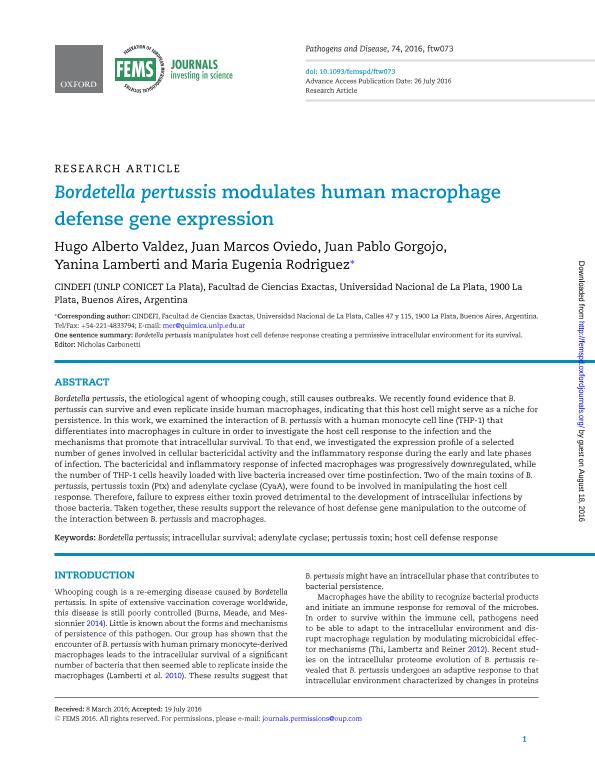Artículo
Bordetella pertussis modulates human macrophage defense gene expression
Valdez, Hugo Alberto ; Oviedo, Juan Marcos
; Oviedo, Juan Marcos ; Gorgojo, Juan Pablo
; Gorgojo, Juan Pablo ; Lamberti, Yanina Andrea
; Lamberti, Yanina Andrea ; Rodriguez, Maria Eugenia
; Rodriguez, Maria Eugenia
 ; Oviedo, Juan Marcos
; Oviedo, Juan Marcos ; Gorgojo, Juan Pablo
; Gorgojo, Juan Pablo ; Lamberti, Yanina Andrea
; Lamberti, Yanina Andrea ; Rodriguez, Maria Eugenia
; Rodriguez, Maria Eugenia
Fecha de publicación:
08/2016
Editorial:
Oxford University Press
Revista:
Pathogens and Disease
ISSN:
2049-632X
Idioma:
Inglés
Tipo de recurso:
Artículo publicado
Clasificación temática:
Resumen
Bordetella pertussis, the etiological agent of whooping cough, still causes outbreaks. We recently found evidence that B. pertussis can survive and even replicate inside human macrophages, indicating that this host cell might serve as a niche for persistence. In this work, we examined the interaction of B. pertussis with a human monocyte cell line (THP-1) that differentiates into macrophages in culture in order to investigate the host cell response to the infection and the mechanisms that promote that intracellular survival. To that end, we investigated the expression profile of a selected number of genes involved in cellular bactericidal activity and the inflammatory response during the early and late phases of infection. The bactericidal and inflammatory response of infected macrophages was progressively downregulated, while the number of THP-1 cells heavily loaded with live bacteria increased over time postinfection. Two of the main toxins of B. pertussis, pertussis toxin (Ptx) and adenylate cyclase (CyaA), were found to be involved in manipulating the host cell response. Therefore, failure to express either toxin proved detrimental to the development of intracellular infections by those bacteria. Taken together, these results support the relevance of host defense gene manipulation to the outcome of the interaction between B. pertussis and macrophages.
Archivos asociados
Licencia
Identificadores
Colecciones
Articulos(CINDEFI)
Articulos de CENT.DE INV EN FERMENTACIONES INDUSTRIALES (I)
Articulos de CENT.DE INV EN FERMENTACIONES INDUSTRIALES (I)
Citación
Valdez, Hugo Alberto; Oviedo, Juan Marcos; Gorgojo, Juan Pablo; Lamberti, Yanina Andrea; Rodriguez, Maria Eugenia; Bordetella pertussis modulates human macrophage defense gene expression; Oxford University Press; Pathogens and Disease; 74; 6; 8-2016; 1-14
Compartir
Altmétricas



